| From California And
Montana With Lots 'N Between. Continued
Californians
A major local
group, the Californians came together in May 1966 as a
product of a change in the Black Diamonds (Sheila
Deni left to go solo). The original Californians
comprised the remaining members of the Black Diamonds,
Roger Clark lead, Pete Abberley bass and
Keith Evans on drums, with John O'Hara as
lead vocalist. They were managed by Roger Allen.
Later members included Mick Brookes (from the
Cobras) who took Roger Clarke's place, Bob Trevis
(from Choice) who replaced Keith Evans, Adrian
Ingram (ex-Choice, Gilt Edge,
Evolution) who became an extra guitarist and
Geoff Parkes who became a second vocalist. Their
intention was to produce close harmonies, reminiscent of
the Beach Boys and the Four Seasons. Their success as a
harmony group was very much down to the tuition they
received from George Taylor, a pianist who had
been a member of the Hedley Ward Trio. From the start
the group was very popular in the local area because of
its clean-cut image and because they made a very
pleasing sound. They were to release quite a number of
records from 1967 to 1969, mainly on Decca.
|
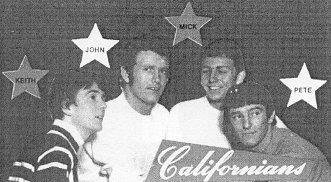
|
Californians.
Just introducing themselves to the
record-buying public. (Mel Brookes) |
|
Their first release was called
Golden Apples, other titles included Sunday Will
Never Be The Same,
Congratulations, You've Got Your Troubles.
While they never reached the Top Twenty, their records
sold well, they toured extensively and made a large
number of radio appearances.
They appeared on one very major
package tour in 1967 with Jimi Hendrix, Cat Stevens,
Englebert Humperdink and the Walker Brothers. |
|
Danny Cannon
(& Ramrods)
Winners of the
first Big Beat Contest at the Gaumont. The group
had their origins in Bilston, having all attended
Etheridge School. The original group comprised Danny
Cannon on vocals, Len Beddow on lead, Pete
Walton on bass, Ken Hooper rhythm and Alan
Lacey on drums. Later changes saw Mick Taylor
in place of Ken Hooper and Brendan Guest in place
of Pete Walton. For many teenage Wulfrunians the Ramrods
represented Rock 'n' Roll. Their original sound was very
much modelled on Buddy Holly and the Crickets. They
appeared at the Toc H Festival at the Royal Albert Hall
in 1962 (almost certainly the first local group to play
at such a famous venue). They were never part of the
Astra set-up. They were managed by the song-writer
Bill Bates who introduced them to Carter-Lewis.
Their first record was released at the end of 1965, by
which time they had changed their name to Herbie's
People.
Cardboard Replica
The group
emerged in 1969 and was very highly regarded. They
performed in Europe and in Israel. The members of the
group were Stan Phillips rhythm and vocals,
Anthony Holyman lead, Anthony Brighton bass
and David Yates on drums. They introduced three
girl dancers to their act which probably helped to
increase their popularity on the Continent.
|
|
Sue Carr
Her real name
was Sue Carrier. She appeared on Up And Doing in
1963 with the Jaguars and with the Condors
during the Midland Groups Galore show at the
Grand Theatre.
Her repertoire
included numbers like
Shout, You're My World and Downtown.
By 1966 she was performing with a backing group called
the Second Thoughts.
She spent time
in Germany and was a member of Pride & Passion.
|
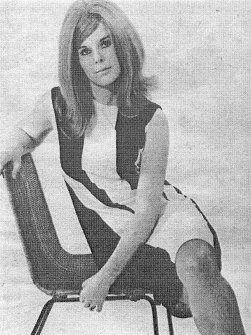
|
Sue Carr.
Sounded good and looked very good. |
|
|
Catacombs
The main
'progressive' music venue in Wolverhampton. It was
located in Temple Street and gained something of
a cult status in the town with an 'upstairs cellar club'
atmosphere. It reminded one of the Express & Star
correspondents of the early days of the Cavern. Its
proprietor was Stephen Dobson who managed to
arrange visits by some of the leading underground
artists of the period including Yes, Caravan, Edgar
Broughton and Taste. At the end of August in 1969 the
club had David Bowie performing there, just a matter of
weeks before Space Oddity entered the charts (a
real coup for the club and the town). Like the Lafayette
it is remembered with deep affection by a whole
generation of Wulfrunians.
Cobras
A Bilston group
which formed in 1965 and comprised Mick Brookes
on lead guitar, Mel Brookes on rhythm, Barry
Dunn on vocals, Nick Cox on bass and Terry
Rhodes on drums. While they never achieved any major
success they were regarded as a workmanlike outfit. Mick
Brookes later became a member of the Californians.
It was reported that at one time Mel Brookes continued
playing with the group, despite breaking his leg. They
were managed by Arthur Brookes, the father of
Mick and Mel. Barry Dunn had previously sang with the
Mountain Kings and later worked for the Nita
Anderson Agency.
Derek Coppen
The person
behind the original skiffle-playing 1956 version of the
Black Diamonds. They had begun playing at the
Finchfield Youth Club and he was one of the first
young Wulfrunian musicians to own an electric Hofner
guitar. When Rock on' Roll appeared on the scene, it
seems that he left the Black Diamonds. His first love
was jazz. He was a member of the Bachelor Four
and won the Radio Luxembourg Make A Tape contest
in 1962 which resulted in him visiting New York as part
of the prize. He described his experiences in New York
for the local newspapers.
Jason Cord
His real name
was Derek Gibbs and he was the lead singer of
Jason Cord and the First Chapter, previously
known as Intent 'n' Purpose. The rest of the
original First Chapter was Phil Williams, Phil
Bird and Steve Rideout on guitars and
Keith Tulley on drums. Later members of the group
were Paul Robbins, Pete Bickley and Mac
Bailey. They used to rehearse at the Station Hotel
in Bloxwich. They recorded for Chapter One records in
1969, issuing two singles; I've Got My Eyes On You
and Why Shouldn’t I? The group was managed by the
former Rock 'n' Roll singer, Dixie Dean. The
group played many of the leading London clubs like,
Speakeasy, Blaises and Bag O' Nails. Paul McCartney
apparently heard them at the Pheasantry club in Chelsea.
Several times the First Chapter did sessions before
Jason Cord appeared on stage, playing a lot of the music
of Cream and Fairport Convention which was far removed
from the music of Jason Cord. It was this combination of
the First Chapter that formed the basis of Fable,
a relatively successful local 70s group which later
included people like Anna Terrana, Pete Mackie
and Pete Goalby.
Crossfires
One of the early
groups in the town (pre-Beatles) which featured Bill
Hayward and Terry Rowley who were to become
two of the stalwart members of the Montanas.
Other members of the group included Arthur Tye
and Ricky Shakespeare. They played the usual mix
of Cliff and other popular numbers from the charts. They
changed their name to the Connoisseurs.
Cross-Cut Saw
A group which
grew out of the Soul Seekers, which itself had
grown out of Dane Tempest & Atoms. They first
appeared at the end of 1967. Their intention was to get
back to their original blues roots which created some
problems since the majority of teenagers were more
interested in dance music than superb blues
musicianship. As a result the venues available to the
group, like the Blue Horizon Club, decreased in
number. Similar to their experiences with the Soul
Seekers, offers of recording contracts were 'in the air'
but never came to fruition. This was a further
disappointment to the group. In 1969 most of the group (Roger
Bromley on lead, Rob Lovack on organ and
drummer Chris Lloyd) formed Straitlace
with new bass player James Hickman providing the
vocals. |
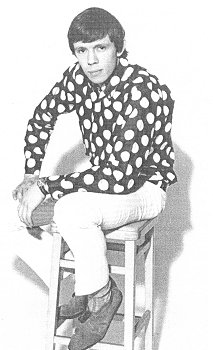
Terry Rowley.
The genius behind much of the good music which came out
of a number of groups, including the Crossfires,
Mountain Kings, Montanas and the original Trapeze.
(Trevor Westwood) |
Tanya Day
One of the first
'schoolgirl singers' to appear on the local scene. She
sang with the Mark Dean Combo in 1962 and by 1964
she had been over to Hamburg and performed in Israel.
She was intent
on finding a backing group with the
Tremors being her preference. Little was heard of
her after1964.
Dixie Dean
Roy 'Dixie' Dean
was one of the original Rock 'n' Roll performers in the
area. His Combo regularly performed at the
Scala and the other early dance halls in the town.
He turned to
management later, having responsibility for
Jason Cord and Johnny Washington and the
Congressmen, amongst others.
|
|
Sheila Deni
Possibly the
most successful of the local girl singers. Her real name
was Sheila Boddicott. She began as a solo singer,
appearing at many of the local venues of the early 60s
(she appeared with Dickie Pride at the Staffordshire
Volunteer in 1962). She was regarded as the "local
Helen Shapiro' in those early days. She came from
Bushbury and was originally managed by Ms. Terry
Matthews from Walsall. In 1963 she went over to
Spain with the Vikings and in 1965 she went to
Germany with the Black Diamonds. While in Germany
she was apparently very successful, sharing an album
with Neil Landon and appearing in a number of German
cities. She and the group stayed over in Germany
somewhat longer than anticipated because of their
success. In 1966 she decided to go solo and as a result,
the Black Diamonds changed their style and became the
Californians. She worked on the cabaret circuit,
especially in the North of England and was one of the
first singers to appear at Roger Allen's club,
the Oasis.
Dictionary Of Soul
One of the first
local groups to possess a 'heavy' soul sound. It was a
large combination which received many rave reviews,
including one from Wilson Pickett, after he saw them at
the Bag O' Nails in London in 1969. They were managed by
Roy Kent and set out to satisfy as many tastes as
possible, although their main interest was in
re-arranging soul standards. They included Dave Leask,
Rod Arnold, Dave Millington, Dave
Richards, Phil Nadin, Trevor Sharples
and Dave Dauncey. At one time the group had three
girl dancers.
Sue Downes
Another of the
young girl singers who were very popular in the early
60s. She had a backing group called the Sprites.
When she left St. Peter's School in 1965 it meant that
she was able to start performing more regularly since
she had been prevented from performing in many venues
because of her age. The group comprised Alan Healey
on bass, Maurice Taylor organ, Dave Kingston
lead, Geoff Tonry rhythm and Ken Morris on
drums. Very little was heard of her after she left
school.
Dual Purpose
They began as a
singing duo that included the former drummer with the
Montanas, Graham Crewe and Jim Millard.
They played in Casablanca and the Isle Of Wight in 1967.
They became Savage Rose in 1968 and then became
the backing group for Lesley Whitehouse which
took the name of Louisa Jane (White) & Symphony.
Ebonies
The most
successful black group in the area during the decade.
They became the virtual residents at the Stage &
Sportsmen's Club in 1964, until they were replaced
by the Stringbeats from West Bromwich when they
went to play in Germany. They spent much of the next two
years on the Continent, especially in Denmark where they
became particularly popular. By 1968 the group comprised
Del Davies vocals, Cecil Reid lead,
Lloyd Shaw bass, Stanford Lindsay rhythm,
Jeff Miller drums and Percy Davies (ex-Bossmen)
organ. The group released its first record in February
1968. They had to return to this country from Denmark
where they almost froze to death in one of the century's
worst snow storms. The record was called Never Gonna
Break Your Heart Again. It was very poorly plugged
and so failed to get the number of sales it deserved,
although many people felt that Shoeshine Boy, the
B side written by Percy Davies was a better song. In
1969 they released Man On A Cross which had a
much funkier sound. They deserved more success than they
actually achieved.
Ensemble
When the 'N
Betweens had their major changes in personnel, the
original lead singer Johnny Howells joined a
Birmingham-based blues group called Blue Ensemble.
This group was also known as Ensemble. They were held in
very high regard by many informed individuals on the
local scene and further afield, often achieving as many
rave notices as the new line-up of the 'N Betweens. They
often played the same London venues, like Tiles, the
Flamingo or Ram Jam Club. Their set included a lot of
Georgie Fame and Wilson Pickett-style material. Their
line-up included Charlie Grimma on drums, John
Burnette on trumpet, Frank Rudge (also of
Giorgio & Marco's Men) on tenor sax, John Barry
on baritone sax, Barry Lunn (ex-Misphits)
on organ, Bill Clarke on bass and Vernon
Pierra on rhythm guitar. They were later known as
Wellington Kitch and the Cedar Set.
Evolution
A group that
emerged in late 1968 and had an immediate impact. The
members of the group were Adrian Ingram (ex-Choice/Gilt
Edge) on lead, Dave Hale on vocals, Roger
Hudson bass and Tom Hanna on drums. Their
style was blues-oriented, with hints of groups like
Family or Fairport Convention. They spent four months in
Morocco in 1969. During their time in Morocco their lead
singer was the Express & Star columnist, John
Ogden. He had played with Jug but wanted to
really experience life as a fully fledged group member.
Two members of the group had to undergo quite severe
hair-cuts before they could enter Morocco. While in the
country they played at a number of quite high-profile
events (Miss Europe Finals and King's Birthday
celebrations). Adrian Ingram later became a member of
the Californians.
Fanny Flickers Rock on' Roll Band
A group which
attempted to bring back some authentic sounding Rock 'n'
Roll to the local scene. The name caused some problems
for them in terms of advertising. One member was John
Fox who played with Varsity Rag. In 1969 the
name was changed to Frazer Nash.
Morgan Fayne Soul Band
Originally
called the Spinning Wheels, they changed their
name because too many people thought they were a folk
group. The group included Roger Craggs on lead,
Trevor Woodall on bass, David Hunt on
piano, Graham Hollis on drums and Morgan Fayne
(Roy Slater) on vocals. Graham Hollis played with
the Montanas and Trevor Woodall played with the
Richelles and the Tommy Burton Combo.
Finders Keepers
Possibly the
most enduring of all local groups (they are still
performing!). They first came together as FK in 1965
with Roy 'Dripper' Kent as vocalist, Alan Clee
on lead, Jake Elcock on bass (all former members
of the Strangers/ Martells), Ralph
Oakley (ex-Montanas) on rhythm and Dave
Williams on drums. Within a very short time they had
established themselves as one of the most popular of the
local groups. They were managed by Roger Allen.
They played in Germany, more than once, and recorded on
Pye. Their records included Light, Friday Kind
Of Monday and Sadie (The Cleaning Lady). They
gained some notoriety by being produced by Scott Walker
on their Light recording and becoming the first
local group to make the lower reaches of the Top 50. In
early 1967 Jake Elcock left the group and joined the
Montanas, while Phil Overfield joined the
group from the Staffords. |
| Later in the same year
Ian Lees
joined as a vocalist. He had been with Walker's
Walkers and Mel Galley became the new lead
guitar. Alan Clee remained with the group.
Roy Kent joined Light Fantastic. In 1968 Glenn
Hughes
and Dave Holland joined. It was at the end of
that year that the group ceased to function with Mel
Galley, Glenn Hughes and Dave Holland joining the newly
formed Trapeze. Alan Clee also worked with
Trapeze. Some time later the group re-emerged and are
still to be found performing their brand of comedy and
pop on the circuit. |
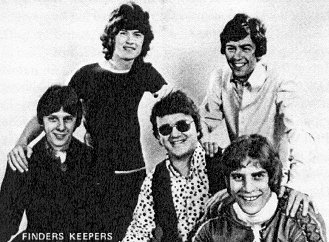
Finders
Keepers. A publicity
photograph for a later version of the group with Glenn
Hughes, Dave Holland and Ian Lees (in shades). |
|
Frazer Nash
From May 1969 it
was the new name for Fanny Flickers. The group
was managed by Nita Anderson. They concentrated
on a somewhat way-out brand of stage presentation,
playing popular numbers but with a 'progressive' sound.
The group had Steve Griffin on organ, Chris
Jones on lead, Roy Davies on bass, Phil
Brittle on drums and Reg James as lead
vocalist.
Raymond Froggatt
Another local
stalwart of the 60s scene who is still performing. He
became the un-crowned king of the Ship & Rainbow
where he appeared very regularly. He was to gain quite
an international reputation. His origins lay in
Kidderminster but he was probably more popular in
Wolverhampton than anywhere else. He recorded on Polydor
and his singles included Red Balloon and Roly.
He had little chart success but he was undoubtedly one
of the most outstanding live artists of the period. He
was responsible for one of the region's biggest concerts
of the late 60s when he fronted a 50-piece orchestra at
the Belfry. He still appears at the Civic
and it is invariably to a sell-out audience.
Gilt Edge
Formed in 1968
with Adrian Ingram and Graham Nock ( ex-Choice),
Fred Griffiths (ex-Lady Jayne & Royalty)
and Roger Hudson. They quickly gained great
popularity in the area (flags were flown from the Prince
Albert Statue in Queen Square, advertising their fan
club). It was reported that both Carl Wayne and Roy Wood
from the Move were very impressed with their sound and
act. They planned to change their name to Lafayette,
but by the end of the year they had split up. Adrian and
Roger later joined Evolution and Adrian also had
some time with the Californians.
Giorgio & Marco's Men
Another of the
town's most outstanding bands. They were never linked to
Astra or Roger Allen or Nita Anderson!
The group grew out of St. Mary's and John's Church
on Snow Hill and was very much the brain-child of
Marco Ucellini.
He was the lead guitarist (previously playing with the
Vampires) and his brother Giorgio was the
vocalist. Other members of the group were Mike O'Dowd,
Pete Byrne, Frank Rudge and Rex Warton.
A later member of the group was Alan King. Their
manager was the parish priest, Mike Crook.
|
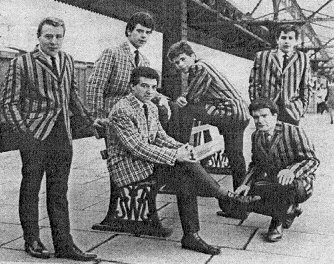
|
Giorgio & Marco's Men.
Seen here in a publicity shot at the railway
station. A group with a very distinctive and
pleasing sound. |
|
The group was signed by ADSEL,
a Birmingham agency, and so they got to play a lot more
away from the town than many of the other local groups
and played at more varied venues (Silver Blades Ice
Rinks). They played in Germany (including the Star Club
in Hamburg) and recorded two singles called Run, Run
and
Maureen (this record led to a competition run by the
group's Fan Club to find the Maureen). It was during one
lengthy spell in Germany that Marco had a whole series
of mishaps that taught him the perils of playing abroad
and led to the group being absent from the scene for
some months. In 1968 they were back and as good as ever.
In 1969 Marco formed a group called Sad. |
|
Martin Hall
On the fringe of
the local scene for much of the 60s, an accomplished
performer and writer. He was highly regarded far beyond
the Midlands but seemed uncertain of his own ability
(turning down the opportunity to play at the Marquee in
1968 because of this uncertainty). He recorded with
Denny Cordell, Joe Cocker and the Rolling Stones. He was
partially responsible for the first record by John
Ford after he left the Ides Of March (Two
s Company, Three’s A Crowd). He was a
significant part of the Willenhall organisation
FP Enterprises (producing and writing the first
record by the group Monday Morning Glory Band's
Play That Thing). He also produced Breakthru's
Ice Cream Tree.
Hari Kari
A group from
Stoke who became extremely popular around
Wolverhampton and the West Midlands. They signed with
Roger Allen in 1967. Their vocalist, Hutch,
had one of the most outstanding voices of all local
frontmen. In 1968 the group comprised Hutch
Hutchinson, Rob Lloyd on lead, Barry
Sergeant on drums and a new organist, Bill Bonham
Jr. Early in 1969 they were auditioned by the man
responsible for 'christening' Ambrose Slade,
Fontana's Jack Baverstock.
Herbie's People
The name taken
by Danny Cannon & Ramrods in 1965. It had been
the name of Len Beddow's (lead guitarist with the
group) brother Norman's group before they became
the Bossmen. Other members of the group included
Dan Robinson on vocals, Alan Lacey on
drums, Pete Walton, Mike Taylor and
Brendan Guest. They recorded for CBS, releasing
three singles - You Thrill Me To Pieces, You
Never Know, Humming Bird. They appeared on
many TV and radio programmes and played in Germany. They
were one of the more successful of the local groups,
although they spent quite a lot of time away from the
immediate area.
|
| Their most successful record
would probably have been Semi-Detached Suburban Mr.
Jones, but they were caught out by the release of
the same song by Manfred Mann with Mr. James as
the subject of their version. Herbie's version was
released in America. One of their B sides Residential
Area appeared on the score of the film Poor Cow.
They even had a Fan Club in Poland. The group added an
organist named
Brian Downey. At the end of 1968 they became Just
William. |
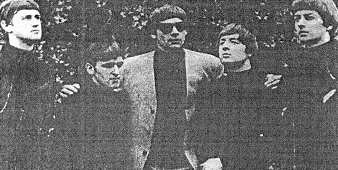
Herbie's
People. The group are seen
here striking that very distinctive 60s pose. (Len
Beddow) |
 |
 |
 |
Return to
the
previous page |
Return to
the Contents |
Proceed to
the
next page |
|